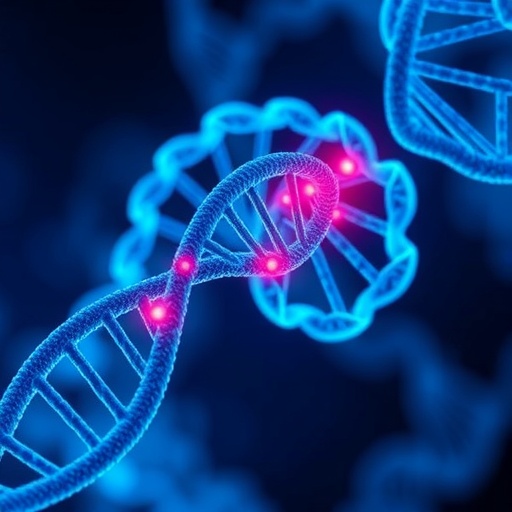CLEVELAND, Ohio (Oct 22, 2025) — Alzheimer’s disease remains a formidable challenge in neuroscience and geriatric medicine, with women disproportionately affected compared to men. Recent epidemiological data confirm that women are significantly more likely than men to develop Alzheimer’s, a disparity that has puzzled researchers for decades. Emerging evidence points to a complex interplay of biological, genetic, and hormonal factors that uniquely affect women’s vulnerability to this debilitating neurodegenerative disorder.
One of the critical factors under investigation is the timing of menopause. Menopause represents a profound endocrine transition characterized by a precipitous decline in circulating estrogens, which are known to exert neuroprotective effects. A new meta-analytic study, leveraging data from nearly 2,600 women, reveals that an earlier age at menopause is correlated not just with general cognitive decline but with a heightened risk of Alzheimer’s disease in later life. This relationship gains additional complexity when considering genetic predispositions and inflammatory status.
The study brings into focus the role of the APOE e4 allele, a well-established genetic risk factor for Alzheimer’s disease. Women carrying this variant demonstrated the most pronounced association between earlier menopause onset and accelerated memory decline. This implies a synergistic effect where the decline in estrogen levels due to menopause interacts with the genetic susceptibility conferred by APOE e4, exacerbating neurodegenerative processes.
Perhaps more intriguing is the modulatory role of systemic inflammation in this nexus. Inflammation, particularly low-grade chronic inflammation that increases with age, has been implicated in the pathogenesis of Alzheimer’s. Among a subset of over 250 participants with detailed inflammatory biomarker profiles, elevated systemic inflammation markedly intensified the negative cognitive impact associated with earlier menopause. Notably, post hoc analyses suggested that this pro-inflammatory exacerbation was more pronounced in APOE e4 carriers, highlighting a triadic interplay between genetics, hormonal changes, and immune function.
These findings provide compelling evidence that both APOE e4 genotype and systemic inflammation potentiate the cognitive vulnerabilities induced by premature menopause. The underlying mechanisms are hypothesized to involve estrogen’s anti-inflammatory and neuroprotective properties, which, when diminished early in life, may fail to counterbalance genetic and inflammatory insults to the brain’s architecture and function.
The research underscores the importance of considering sex-specific biological processes in Alzheimer’s disease research and therapeutics development. Traditionally, clinical trials and therapeutic strategies have often underestimated or overlooked female-specific risk factors such as menopause, despite the fact that around 20% of Alzheimer’s drugs in development target genetic and inflammatory pathways. A nuanced understanding of how these factors intersect in women could catalyze breakthroughs in precision medicine tailored to this demographic.
This study, presented at the 2025 Annual Meeting of The Menopause Society in Orlando, draws attention to the critical need for integrative approaches that consider hormone biology, genetics, and immunology concurrently. Such an approach promises to refine risk stratification models, enabling earlier identification of women at heightened risk and paving the way for preventative interventions during or before the menopausal transition.
Moreover, the results invite a paradigm shift in how clinicians view menopause—not only as a reproductive milestone but as a critical window of neurocognitive vulnerability. Understanding the temporal relationship between declining estrogen levels, genetic risk factors like APOE e4, and systemic inflammation could lead to innovative strategies aimed at mitigating Alzheimer’s risk, such as hormone replacement therapies carefully tailored to genetic and inflammatory profiles.
Expert commentary from Madeline Wood Alexander, the lead author based at the University of Toronto and Sunnybrook Research Institute, emphasizes the clinical implications. “Sex differences and female-specific biological processes are paramount to understanding Alzheimer’s pathophysiology. Our data suggest that these factors should be integral to designing clinical trials and developing therapies that are effective for women,” she notes.
Dr. Stephanie Faubion, the medical director of The Menopause Society, stresses that targeted prevention and treatment strategies must account for these biological nuances. “Given the disproportionate risk women face, there is a pressing need to dissect the sex and gender mechanisms driving Alzheimer’s risk. Only then can we hope to devise personalized interventions that improve outcomes for women at risk,” she states.
The study’s meta-analytic methodology provides robust evidence by synthesizing a large body of data, enhancing the statistical power to detect subtle interactions between menopause timing, genetic background, and inflammation. This rigorous approach strengthens the case for viewing Alzheimer’s risk through a multifactorial lens.
Ultimately, these findings spotlight the need for a multidimensional therapeutic framework that incorporates genetic screening for APOE status, monitoring of inflammatory biomarkers, and evaluation of menopausal age in clinical settings. Such integration could transform the management of Alzheimer’s risk in women, affording opportunities for earlier behavioral, pharmacological, and lifestyle interventions.
As research in this domain accelerates, the inclusion of women’s health perspectives remains indispensable. The Menopause Society continues to advocate for advancements in understanding how the menopause transition shapes long-term brain health. Future clinical trials exploring anti-inflammatory agents or hormone therapies may benefit from stratifying participants based on APOE genotype and menopausal timing to optimize efficacy.
For women navigating menopause, these insights emphasize the importance of proactive health monitoring and personalized risk assessment. The convergence of genetics, endocrinology, and immunology represents a frontier in Alzheimer’s research with the potential to significantly alter disease trajectories, especially for women who have historically been underrepresented in biomedical studies.
The detailed results of this pivotal study will be further elaborated at the 2025 Annual Meeting of The Menopause Society, extending a clarion call for interdisciplinary collaboration in tackling Alzheimer’s disease risk in women. Ultimately, such endeavors hold promise not only for improving cognitive aging outcomes but also for unraveling the intricate biology that defines female brain health across the lifespan.
Subject of Research: People
Article Title: Inflammation and APOE e4 genotype modify the link between earlier menopause and memory decline
News Publication Date: October 22, 2025
Web References: http://dx.doi.org/10.1097/GME.0000000000000002541
References: Menopause Journal
Keywords: Health and medicine




